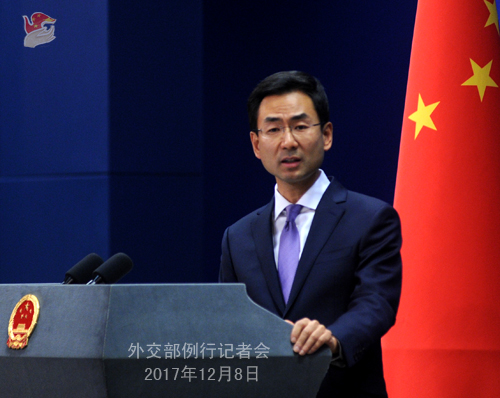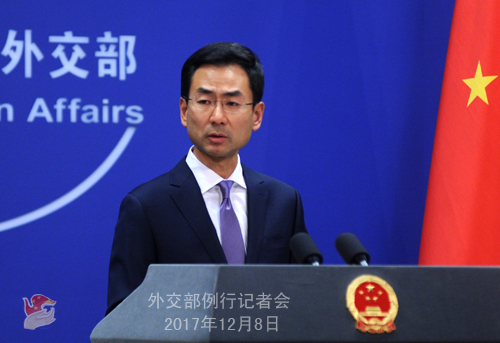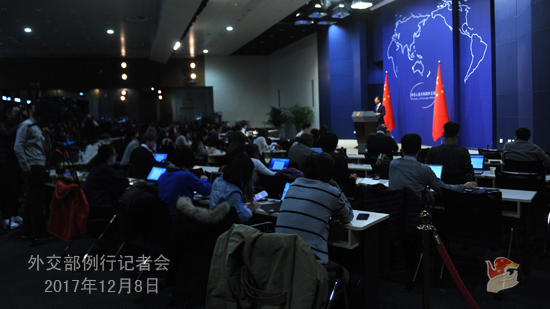| Foreign Ministry Spokesperson Geng Shuang's Regular Press Conference on December 8, 2017 |
| 2017-12-08 22:30 |
|
Q: The Australian leader said yesterday at the Federal Parliament that Australia takes seriously the media reports about China's interference in Australian affairs, and the relationship with China is far too important to be put at risk by failing to clearly set the terms of healthy and sustainable engagement. He also believes Australia will assert its sovereignty with parliament and with laws What is your comment? A: We are shocked by the Australian leader's remarks which are lack of principle and simply pander to those irresponsible reports by some Australian media. Imbued with bias towards China, these groundless and unfounded remarks can sabotage China-Australia relations and are detrimental to the foundation of mutual trust and cooperation. We are strongly dissatisfied with those remarks and has lodged stern representations with the Australian side. China consistently develops its relations with other countries on the basis of mutual respect and non-interference in domestic affairs. That is also how we pursues our relationship with Australia. We strongly urge the relevant people in Australia to shake off their Cold War mentality and bias against China, immediately stop uttering false remarks that undermine political mutual trust and mutually beneficial cooperation, and take effective measures to offset negative effects so as to avoid disrupting and impacting the development of China-Australia relations. Q: The visit of Canadian Prime Minister Justin Trudeau to China did not bring about the launch of negotiations on the China-Canada free trade agreement, which was interpreted by some media as failing to achieve the expected results. What is your comment? A: Canadian Prime Minister Justin Trudeau paid an official visit to China. He had wide-ranging and in-depth talks with Chinese leaders on bilateral relations and issues of common interest, and important consensus were reached and outcomes achieved. Both sides spoke positively of important journey covered by bilateral relations last year and fully affirmed the positive role played by bilateral dialogue mechanisms including the annual dialogue between the Chinese Premier and the Canadian Prime Minister, the annual meeting between Foreign Ministers, the China-Canada Economic and Financial Strategic Dialogue, and the High-level National Security and Rule of Law Dialogue. A joint statement on climate change and clean growth was issued and two new ministerial-level dialogues on environment and clean energy were established. Both sides agreed to deepen pragmatic cooperation in areas such as trade and investment, clean technology, aviation and aerospace, expand people-to-people exchanges in the fields of tourism, education and culture, and successfully run the China-Canada Year of Tourism next year. Both sides would strengthen communication and coordination in international and regional affairs and work together against global challenges including climate change. During the visit, the two countries also signed bilateral cooperation documents on education, food safety, and energy, among others. With regard to your question about the FTA, during Prime Minister Trudeau's visit, both sides had friendly and in-depth discussion on the China-Canada FTA, showing willingness to enter into one. Both sides agreed to advance economic globalization, promote trade and investment liberalization and facilitation, and advancing China-Canada free trade building with a pragmatic and open attitude so as to create conditions for an early start of negotiations. We believe that Prime Minister Trudeau's visit is a successful one as China-Canada relationship is entering a new golden era. On the basis of mutual respect, equal treatment, mutual benefit and win-win results, China would like to work with Canada to implement consensus reached between the two leaders and move forward China-Canada Strategic Partnership. Q: According to reports, on December 7, Taiwan and the Philippines signed seven cooperation documents, including one on investment protection agreement. The Philippines is the first to sign such agreement among those whom Taiwan's "New Southward Policy" is targeted. What's your comment on this? It is reported that China has lodged representations with the Philippines for this reason. Can you confirm that? A: China sees no objection to a country that has diplomatic ties with China conducting normal economic, trade and people-to-people exchanges with Taiwan, but does firmly oppose it conducting with Taiwan any form of official engagement or signing any agreement or cooperation document with sovereign implication. We express grave concern over the signing of the investment protection agreement and other cooperation documents that are obviously official in character between the relevant Philippine authority and the Taiwan authority. China has lodged representation with the Philippine side. We hope the Philippines will abide by the one-China principle and avoid having the Taiwan-related issue undermine the larger picture of China-Philippines relations.
Q: Yesterday, President Xi Jinping formally signed the free trade agreement with Maldives during the visit of the Maldives' President. There has been some criticism in the Maldives about the free trade agreement. The Maldives' opposition said the agreement was signed too quickly and with insufficient oversight from the Maldives' parliament and the details of the FTA have been shrouded in secrecy. How do you respond to these concerns from the opposition in the Maldives? A: I responded to this question previously. I can briefly repeat my answer here. The signing of the China-Maldives free trade agreement is an important consensus reached by the leaders of the two countries and conforms to the trend of economic globalization. The two sides have conducted several rounds of negotiation under the principle of mutual respect, equality and mutual benefit, culminating in this fairly high-standard, mutually beneficial and win-win free trade agreement. This is not only conducive to the sustainable development of China-Maldives economic and trade relations, but also to the improvement of the trade and investment liberalization and facilitation of this region. If my memory serves me right, head of the Department of International Trade and Economic Affairs of the Ministry of Commerce already gave a detailed briefing on the China-Maldives free trade agreement which is now available for you to refer to on the website of Ministry of Commerce. Q: Regarding the suing case on the Venezuelan state oil company PDVSA brought up by Sinopec's US subsidiary at the federal court in Huston, media reports say that this case revealed China's waning confidence in and patience with Venezuela because of the country's debt crisis. What is your comment? A: As I said yesterday, it is an ordinary commercial dispute. There is no need to read too much into it. We have learnt that the two parties involved are seeking to resolve the issue as soon as possible through friendly consultation. China attaches high importance to the development of China-Venezuela relations and believes in the Venezuelan government and people in properly handling their debt issue. We stand ready to continue with our all-around pragmatic cooperation with Venezuela on the basis of equality, mutual benefit and common development. Q: The China-DPRK Friendship Bridge will be closed on December 11 because of maintenance work. How will this affect China's implementation of the UN Security Council resolutions? A: I see no link between these two things. Q: Yesterday, Russian Foreign Minister Lavrov told US Secretary of State Tillerson that the DPRK wishes to have direct talks with the US, and the DPRK would want to discuss security guarantees first with the US. Russia would like to facilitate such negotiations. What is your comment? Is China also willing to facilitate such talks? A: We encourage all parties including Russia to endeavor to bring the Korean Peninsula nuclear issue back to the track of peaceful settlement through dialogue and consultation. We keep stressing that the essence of the Korean Peninsula nuclear issue is a security issue with the DPRK-US disputes at the core. As parties directly concerned in the Korean Peninsula nuclear issue, the DPRK and the US should engage with each other and work to resolve this issue through dialogue and negotiation. China has been working on both sides towards this goal.
|
 |
|


